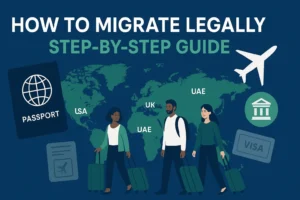Learn how to migrate legally in 2025 with this step-by-step guide. Discover visa requirements, documents, legal routes, and safe migration tips for a smooth relocation abroad.
Migrating to another country can open up new opportunities for work, education, or a better lifestyle. However, doing it the right way is important to avoid risks, scams, or deportation. In this guide, you’ll learn how to migrate legally, what documents you need, and the safest options available.
Basic Information
| Requirement | Details |
|---|---|
| Passport | Must be valid for at least 6 months beyond your intended stay. |
| Visa Application | Apply for the correct visa type (work, study, skilled migration, family reunion, etc.). |
| Proof of Funds | Evidence of sufficient funds to cover living expenses abroad. |
| Medical & Police Clearance | Required by most countries to ensure good health and no criminal record. |
| Language Test (if needed) | Countries like Canada, UK, and Australia may require IELTS/TOEFL. |
| Travel Insurance | Often required for safety and emergencies. |
Legal Ways
1. Study
If you want to continue your education, apply for a student visa. Many countries allow students to work part time while studying.
2. Work
Look for high-demand jobs abroad where employers sponsor foreign workers. Skilled workers are always in demand in countries like Canada, Germany, and the UAE.
3. Marriage 
If you have family members abroad, you can apply for family reunification visas. Spousal visas are also a legal migration route.
4. Skilled
Countries such as Canada, Australia, and New Zealand offer points-based immigration systems for skilled workers.
5. Investor
For entrepreneurs and investors, many countries provide business or investment visas.
Steps
-
Research your destination country Check visa requirements and opportunities.
-
Prepare your documents Passport, certificates, proof of funds, and health reports.
-
Apply through official channels Use the embassy website or government portal.
-
Avoid agents or fraudsters Always verify if an agency is licensed.
-
Attend embassy interviews Be ready to answer questions about your plans abroad.
-
Follow legal stay rules Respect visa duration and renew if needed. How to Migrate Legally
Contact Information
| Service | Details |
|---|---|
| Embassy Website | Visit the official embassy/consulate of your destination country. |
| Immigration Office | Check your local government’s immigration department. |
| Helpline | Use official hotlines for visa and migration queries. |
Tips
-
Always verify information on government websites.
-
Do not overstay visas it can affect future applications.
-
Learn about the culture, language, and job market before you move.
-
Keep digital and physical copies of all your documents.
Conclusion
Migrating to another country is exciting but must be done legally and carefully. Whether through study, work, or family reunification, always use official channels to stay safe.
If you found this guide helpful, explore more migration tips and job opportunities on jamjamz.com.ng to kickstart your journey today. How to Migrate Legally
FAQ’s
1. What does it mean to migrate legally?
Migrating legally means moving to another country with the correct visa, permits, and documentation approved by the host country’s government.
2. What is the easiest country to migrate to legally?
Countries like Canada, Germany, Australia, and the UAE are considered easier to migrate to due to skilled worker shortages and friendly immigration policies.
3. Can I migrate without IELTS?
Yes. Some countries such as Poland, Turkey, Hungary, UAE, and some EU nations allow migration without IELTS. However, for countries like Canada, UK, and Australia, IELTS or TOEFL is often How to Migrate Legally required.
4. How much money do I need to migrate legally?
It depends on the destination. For example:
-
Canada: Around $12,000 to $15,000 CAD for a single applicant.
-
UK: Proof of funds of £1,270+ depending on visa type.
-
Dubai/UAE: Usually less costly, employers often cover expenses.
5. Can I work while studying abroad?
Yes. Most countries allow 20 hours per week during study periods and full-time during holidays, but rules vary depending on the country.
6. How can I avoid migration scams?
-
Always apply through official embassy or government websites.
-
Avoid unregistered agents.
-
Double-check job How to Migrate Legally offers to ensure they are legitimate.
7. Can I migrate with my family?
Yes, many countries provide family reunification visas, allowing you to bring your spouse and children if you meet financial and accommodation requirements.
8. What happens if I overstay my visa?
Overstaying a visa is illegal. It can lead to fines, deportation, and bans from re-entering that country in the future. How to Migrate Legally
9. Which visas are most common for legal migration?
-
Student visas
-
Work visas (job sponsorship)
-
Skilled migration visas
-
Family reunification visas
-
Investor/business visas
10. Where can I get reliable information about legal migration?
The best sources are:
-
The official embassy website of your destination country
-
Your local immigration office
-
Verified migration consultants with How to Migrate Legally government approval